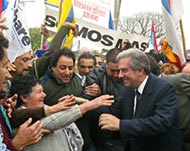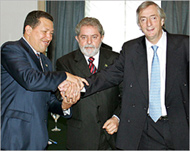Latin America takes a leftward turn
Latin America is turning left. With Tabare Ramon Vazquez Rosas becoming the first ever left leader in Uruguay on 1 March, more than three quarters of the continent’s 355 million people are living under leftist governments.

Vazquez’s presidential ceremony in the capital Montevideo was a roll call of those who have turned the politics of this hemisphere upside down in six short years:
Hugo Chavez, who won in Venezuela in 1999, Ecuador’s Lucio Gutierrez and Brazil’s Luiz Inacio Lula da Silva who
won in 2002 and Nestor Kirchner of Argentina who came to power in 2004.
Vazquez’s symbolic first action was the full restoration of diplomatic ties with Cuba. Fidel Castro failed to appear, citing health reasons but promised a visit soon.
His foreign minister Felipe Perez Roque was welcomed with open arms.
On the horizon are potential victories for Evo Morales in Bolivia, Michelle Bachellet in Chile’s December vote and Manual Lopez Obrador, the mayor of Mexico city and presidential candidate.
Former political prisoners
It all adds up to a sea change with an assortment of rebels, guerrillas and opponents of military governments – which dominated the region in the 70s – coming of age and taking control.
Uruguay’s military government lasted from 1973 until a political amnesty in 1985.
|
“The 19th was the century of Europe, the 20th was the century of the United States and the 21st century will be that of Latin America” Hugo Chavez, |
Five of the country’s new ministers are former political prisoners or exiles.
The new head of the Senate, Jose “Pepe” Mujica was held in a dried-up well in the ground for part of his 15 years of incarceration.
Fellow rebel of the Tupamaro National Liberation Movement, Nora Castro, will head the House of Deputies.
Former exiles in Spain and Argentina, Reinaldo Gargano and Jose Diaz, will take up the posts of foreign and interior ministers respectively.
New blood promised
It is a generation of pensioners and the 65-year-old Vazquez has already indicated that the old guard in his cabinet will step aside to make way for new blood by the end of 2006.
“It is with great happiness to be with all of you [new ministers] on a day of great transition for the country,” he said, adding: “I will work tirelessly for the prosperity of the Uruguayan people.”
Vazquez and Mujica were applauded by vast numbers when they appeared on the balcony of the independence building.
The crowd chanted “the people, united, will never be defeated”, according to the El Observador newspaper.
Career path
Vazquez, a celebrated cancer specialist, entered politics in 1987 and had previously stood for president twice.
 |
|
Vazquez, Uruguay’s first leftist |
It was an emphatic and historic first round victory in October 2004 which broke the 180-year-old oligarchy between the Brancos and Colorados since independence in 1825.
Uruguay, a country sandwiched between Brazil and Argentina, suffered its worst economic crisis in 2002 which left a third of its population under the poverty line.
It has the lowest birthrate, lowest population growth and oldest population in Latin America – more than half the people are over 50.
Moreover, it has the greatest emigration rate – on average more than 100 people left each day in 2003.
Returning emigrants
But the Uruguayan community living in Argentina has begun to return and the country is in the grip of a wave of hope.
In his first speech as president, Vazquez promised “progressive exchange with our neighbours”. Referring to the country’s dark military past, he declared that “never again we will be brothers against brothers”.
Vazquez has already announced an emergency US$100 million social plan to guarantee a basic level of nutrition and sanitation for excluded communities.
Wasting no time, he has signed an energy deal with Chavez and launched an investigation with Kirchner into 150 Uruguayans who “disappeared” during Argentina’s authoritarian rule.
United front
And all three leaders, together with Brazil’s Lula, vowed to have a united front in the face of external debt and international credit institutions.
 |
|
(L-R) Venezuela’s Chavez, Brazil’s |
“The 19th was the century of Europe, the 20th was the century of the United States and the 21st century will be that of Latin America,” said Chavez at the ceremony.
With the exception of Chavez, the continent has undergone a soft revolution.
Agreements with the International Monetary Fund have been kept and the US appeased, but with a new focus on poverty and social programmes within these constraints.
With each election, Latin America’s face is changing against the Washington consensus. Unity between the left’s leaders is becoming strengthened and they are looking wider afield, forging ties with China, India and South Africa.